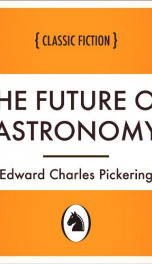Pickering Edward Charles

Edward Charles Pickering (July 19, 1846–February 3, 1919) was an American astronomer and physicist, brother of William Henry Pickering. Along with Carl Vogel, Pickering discovered the first spectroscopic binary stars. He wrote Elements of Physical Manipulations (2 vol., 1873–76). Pickering attended Boston Latin School, and received his B.S. from Harvard in 1865. Later, he served as director of Harvard College Observatory from 1877 to his death in 1919, where he made great leaps forward in the gathering of stellar spectra through the use of photography. At Harvard, he recruited many women to work for him, including Annie Jump Cannon, Henrietta Swan Leavitt, and Antonia Maury. These women, who came to be known as "Pickering's Harem" by the scientific community, made several important discoveries at HCO. Leavitt's discovery of the period-luminosity relationship for Cepheids, published by Pickering[1], would prove the foundation for the modern understanding of cosmological distances. In 1876 he co-founded the Appalachian Mountain Club. In 1911 he co-founded the American Association of Variable Star Observers (AAVSO) with William T. Olcott. Awards Named after him (all jointly named after him and his brother William Henry Pickering)
do you like this author?
What readers are saying
What do you think? Write your own comment on this book!
write a commentWhat readers are saying
What do you think? Write your own comment on this author!
write a commentBook list

The Future of Astronomy
Series:
Unknown
Year:
Unknown
Raiting:
4/5
This book was converted from its physical edition to the digital format by a community of volunteers. You may find it for free on the web. Purchase of the Kindle edition includes wireless delivery.
Show more
add to favoritesadd In favorites
Book list

The Future of Astronomy
Series:
Unknown
Year:
Unknown
Raiting:
4/5
This book was converted from its physical edition to the digital format by a community of volunteers. You may find it for free on the web. Purchase of the Kindle edition includes wireless delivery.
Show more
add to favoritesadd In favorites
What readers are saying
What do you think? Write your own comment on this author!
write a commentif you like Pickering Edward Charles try:
readers also enjoyed
What readers are saying
What do you think? Write your own comment on this author!
write a commentif you like Pickering Edward Charles try:
readers also enjoyed
Do you want to exchange books? It’s EASY!
Get registered and find other users who want to give their favourite books to good hands!

